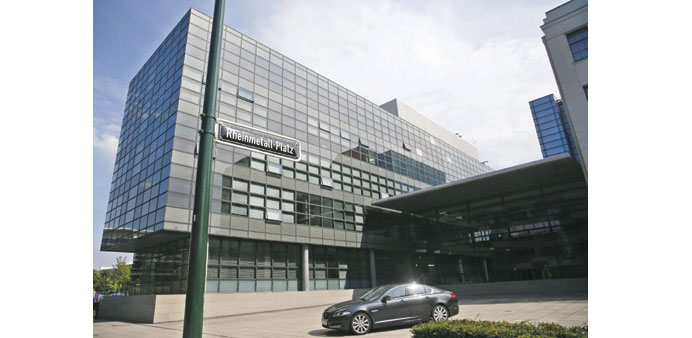A limousine leaves the headquarters of Rheinmetall in Duesseldorf yesterday. Germany has permanently halted Rheinmetall’s planned export of combat simulation equipment to Russia, the Economy Ministry confirmed yesterday, going beyond recently imposed European Union sanctions which block future defence contracts.
Reuters
Germany has permanently halted Rheinmetall’s planned export of combat simulation equipment to Russia, the Economy Ministry confirmed yesterday, going beyond recently imposed European Union sanctions which block future defence contracts.
Economy Minister Sigmar Gabriel, a Social Democrat (SPD), originally blocked the deal in March and has now permanently stopped it, the ministry said.
The contract, worth about €100mn, had been approved by Germany’s previous government.
“This is not about money, this is about lives,” Gabriel told reporters yesterday in Potsdam when asked if the government would face compensation claims from Rheinmetall.
He added that he did not know of any other projects in Germany facing a similar fate. “I can confirm that, in the light of the EU sanctions, permission to export a combat training centre has been revoked,” a spokesman said.
A spokeswoman for the Economy Ministry told a news conference that most of the combat simulation equipment had not yet been sent to Russia and that the incomplete system was not capable of being used by Russia.
“This shows that we’re imposing a more restrictive arms policy,” she said.
When asked if Rheinmetall had a right to compensation, she said in principle they do, but must make a claim. Rheinmetall earlier yesterday said that it was in talks with the German government.
It said Berlin’s intention to stop to the deal had now been delivered in writing. Rheinmetall declined to comment on the details of the contract nor on whether it might claim compensation.
The company has repeatedly said that sanctions against Russia would not have a major impact on its business because the combat training centre, its only major contract with the country, has been largely delivered and paid for.
Germany’s Sueddeutsche newspaper said the combat training centre, which was to be built in the town of Mulino in the Volga region and was expected to go into service this year, could train 30,000 soldiers a year on simulators.
Tough new economic sanctions against Russia will hurt Germany’s economy but they are necessary for the sake of peace in Europe, Gabriel, who is also German vice chancellor, said in a television interview on Sunday.
In contrast, France is pressing ahead with a €1.2bn ($1.6bn) contract to supply Russia with a warship.
European Union sanctions that took effect on Friday target Russia’s banking, defence and energy sectors because of Moscow’s support for pro-Russian separatist rebels battling Kiev’s forces in eastern Ukraine.
The ministry spokeswoman said that the government was in contact with the firm, which will have the opportunity to claim financial damages for the scrapping of the contract. By stopping the deal, Germany goes beyond economic sanctions against Russia agreed last week by the European Union.
Those restrictions ban arms exports to Russia but do not cover existing contracts, including a 1.2bn-euro deal by France to deliver two Mistral warships to Russia.
Paris has said it would go ahead with the sale of the first vessel, drawing criticism from European partners including Germany and Britain.
A spokesman for German Chancellor Angela Merkel said Berlin hoped that tougher sanctions covering already signed deals could still be agreed.

